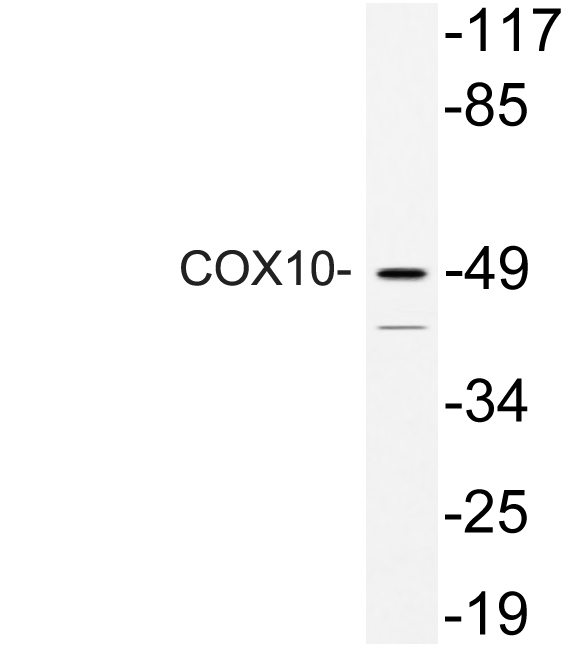COX10 Polyclonal Antibody
- Catalog No.:YT1068
- Applications:WB;ELISA
- Reactivity:Human;Mouse
- Target:
- COX10
- Fields:
- >>Oxidative phosphorylation;>>Porphyrin metabolism;>>Metabolic pathways;>>Biosynthesis of cofactors;>>Thermogenesis
- Gene Name:
- COX10
- Protein Name:
- Protoheme IX farnesyltransferase mitochondrial
- Human Gene Id:
- 1352
- Human Swiss Prot No:
- Q12887
- Mouse Swiss Prot No:
- Q8CFY5
- Immunogen:
- The antiserum was produced against synthesized peptide derived from human COX10. AA range:98-147
- Specificity:
- COX10 Polyclonal Antibody detects endogenous levels of COX10 protein.
- Formulation:
- Liquid in PBS containing 50% glycerol, 0.5% BSA and 0.02% sodium azide.
- Source:
- Polyclonal, Rabbit,IgG
- Dilution:
- WB 1:500 - 1:2000. ELISA: 1:10000. Not yet tested in other applications.
- Purification:
- The antibody was affinity-purified from rabbit antiserum by affinity-chromatography using epitope-specific immunogen.
- Concentration:
- 1 mg/ml
- Storage Stability:
- -15°C to -25°C/1 year(Do not lower than -25°C)
- Other Name:
- COX10;Protoheme IX farnesyltransferase; mitochondrial;Heme O synthase
- Observed Band(KD):
- 49kD
- Background:
- Cytochrome c oxidase (COX), the terminal component of the mitochondrial respiratory chain, catalyzes the electron transfer from reduced cytochrome c to oxygen. This component is a heteromeric complex consisting of 3 catalytic subunits encoded by mitochondrial genes and multiple structural subunits encoded by nuclear genes. The mitochondrially-encoded subunits function in electron transfer, and the nuclear-encoded subunits may function in the regulation and assembly of the complex. This nuclear gene encodes heme A:farnesyltransferase, which is not a structural subunit but required for the expression of functional COX and functions in the maturation of the heme A prosthetic group of COX. This protein is predicted to contain 7-9 transmembrane domains localized in the mitochondrial inner membrane. A gene mutation, which results in the substitution of a lys
- Function:
- disease:Defects in COX10 are a cause of cytochrome c oxidase deficiency (COX deficiency) [MIM:220110]. COX deficiency is a clinically heterogeneous disorder. The clinical features are ranging from isolated myopathy to severe multisystem disease, with onset from infancy to adulthood.,disease:Defects in COX10 are a cause of Leigh syndrome (LS) [MIM:256000]. LS is a severe neurological disorder characterized by bilaterally symmetrical necrotic lesions in subcortical brain regions.,function:Converts protoheme IX and farnesyl diphosphate to heme O.,similarity:Belongs to the ubiA prenyltransferase family.,
- Subcellular Location:
- Mitochondrion membrane; Multi-pass membrane protein.
- Expression:
- Brain,
- June 19-2018
- WESTERN IMMUNOBLOTTING PROTOCOL
- June 19-2018
- IMMUNOHISTOCHEMISTRY-PARAFFIN PROTOCOL
- June 19-2018
- IMMUNOFLUORESCENCE PROTOCOL
- September 08-2020
- FLOW-CYTOMEYRT-PROTOCOL
- May 20-2022
- Cell-Based ELISA│解您多样本WB检测之困扰
- July 13-2018
- CELL-BASED-ELISA-PROTOCOL-FOR-ACETYL-PROTEIN
- July 13-2018
- CELL-BASED-ELISA-PROTOCOL-FOR-PHOSPHO-PROTEIN
- July 13-2018
- Antibody-FAQs
- Products Images

- Western blot analysis of mouse-kidney mouse-brain Hela KB 293T lysis using COX10 antibody. Antibody was diluted at 1:1000

- Western blot analysis of lysate from HeLa cells, using COX10 antibody.



